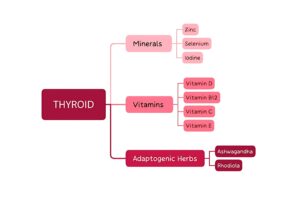Boost Your Energy Levels with These Thyroid Health Enhancing Tips.
The thyroid gland is an important part of the endocrine system that produces hormones responsible for regulating various body functions, including metabolism, growth, and development. It regulates your metabolism, energy production, weight, and temperature. If it’s not working properly, it may contribute to negative symptoms like fatigue, sluggishness, and unable to shed weight despite your best efforts. Your thyroid function is directly related to your mitochondrial health, which may be contributing to your challenges.
Hypothyroidism is an underactive thyroid gland that fails to produce adequate thyroid hormones and can lead to low energy, weight gain, dry skin, hair loss, and cognitive impairment. On the other hand, hyperthyroidism, an overactive thyroid, can cause weight loss, anxiety, and other symptoms. Utilising natural medicine to support mitochondrial health can improve energy levels. This article delves into the benefits of natural medicine and how it can contribute to maintaining a healthy thyroid function.

How can Adaptogenic Herbs Help?
If you’re feeling stressed out, whether it is caused by work, personal issues, or health problems, adaptogens could be the solution you need to help your body cope with the stress response. Adaptogenic herbs regulate the body’s response to stress, helping to lower cortisol levels, which can prevent the disruption of thyroid function and improve energy levels.
Ashwagandha and Rhodiola are examples of adaptogenic herbs that are known for their stress-reducing properties. Ashwagandha has been shown to help reduce anxiety and improve overall well-being, while Rhodiola has been shown to help with fatigue and increase endurance. So, if you’re under stress and looking for a natural way to help your body cope, adaptogens and essential nutrients listed below can be an effective solution to support healthy thyroid function and improve your overall well-being.
What Nutrients are Essential for Thyroid Function?
Iodine
Iodine is a crucial mineral that is key in producing thyroid hormones. The thyroid gland utilises iodine to produce thyroxine (T4) and triiodothyronine (T3), which are the two primary hormones that regulate metabolism. These hormones are not only involved in regulating the body’s metabolic rate, but they also have several other vital functions. For instance, thyroid hormones are essential for cellular energy production, temperature regulation, brain development, and maintaining healthy skin, hair, and nails.
They also help in the development and function of the reproductive system and the growth of bones. However, insufficient iodine intake can lead to iodine deficiency disorders such as goitre and hypothyroidism. A goitre is an enlargement of the thyroid, which occurs as a response to low iodine levels.
Hypothyroidism occurs if the thyroid gland fails to produce enough of the hormones the body requires to function properly. This deficiency may be due to a lack of iodine. If you are getting your thyroid tested, it is recommended that you also request an iodine test. If the iodine levels are low, incorporating iodine-rich foods into your diet or taking an iodine supplement may help correct the thyroid hormone imbalance.
When you consume an excessive amount of iodine through your diet or medication, it can result in the production of excess thyroid hormones. These hormones, when produced in excess, can lead to hyperthyroidism, a condition in which your thyroid gland works excessively, causing various symptoms such as weight loss, irregular heartbeat, and anxiety. Therefore, it is essential to maintain a balanced and moderate intake of iodine to prevent any adverse effects on your thyroid gland.
Selenium
Selenium has a vital role in the proper functioning of the thyroid gland. The thyroid gland relies on this essential mineral to produce and regulate hormones that are important for maintaining various bodily functions. Selenium supports the conversion of the inactive form of the thyroid’s hormone, thyroxine (T4), into the active form, triiodothyronine (T3). This conversion process is necessary for the body to use thyroid hormone properly.
If additional selenium is taken, it acts as an antioxidant, protecting the thyroid from oxidative stress, which can cause damage to the gland and impair its function. Selenium deficiency can lead to health problems, including goitre, thyroiditis, and hypothyroidism. Therefore, ensuring adequate selenium intake through diet or supplements is important to support thyroid health.
Zinc
Zinc is a vital mineral that plays a role in many physiological processes, including synthesising and converting thyroid hormones. Zinc is a cofactor for the enzymes involved in processes, such as thyroxine (T4) to triiodothyronine (T3) conversion. Specifically, the enzyme iodothyronine deiodinases, which are responsible for converting T4 to T3, require zinc as a cofactor for their activity.
Moreover, Zinc is also essential for transporting thyroid hormones in the bloodstream. Therefore, a deficiency in Zinc levels can lead to impaired thyroid function and reduced levels of circulating thyroid hormones. Symptoms such as fatigue, weight gain, and poor immune function may occur. It is a key to maintaining adequate levels of Zinc in the body to support healthy thyroid function.
Vitamin D
Vitamin D, an essential nutrient, plays a significant role in the body’s overall health and well-being. Vitamin D receptors are present on thyroid cells, allowing the thyroid to affect the production and regulation of thyroid hormones directly. This means that the thyroid function depends on the availability of vitamin D in the body.
Studies show vitamin D deficiency to be associated with decreased thyroid hormone levels and impaired thyroid function. Vitamin D deficiency may lead to a range of thyroid problems, including hypothyroidism, an autoimmune disorder that causes an underactive thyroid gland, and Hashimoto’s thyroiditis, an inflammation of the thyroid gland.
The thyroid gland requires sufficient vitamin D to function correctly. Otherwise, it can lead to a range of symptoms, including fatigue, weight gain, and depression. Therefore, it is essential to maintain adequate vitamin D levels to ensure proper thyroid function.
Vitamin B12
Vitamin B12 plays a significant role in supporting thyroid health by contributing to vital bodily functions. Although it does not directly control thyroid function, it aids in promoting overall thyroid health through various mechanisms:
Energy Production: Vitamin B12 is necessary to make red blood cells that carry oxygen to cells, including those in the thyroid gland. This oxygen supply is crucial for energy-producing processes in cells.
Metabolism Support: Vitamin B12 aids in the metabolism of fats and carbohydrates, essential for maintaining a healthy body weight. Weight management is interconnected with thyroid function.
Nerve Function: Vitamin B12 is crucial for the health of the nervous system, including the nerves that regulate thyroid activity.
Methylation Processes: Vitamin B12 plays a key role in methylation processes, influencing the conversion of homocysteine to methionine. This process is vital for various biochemical reactions, including the synthesis of thyroid hormones.
Although vitamin B12 does not directly regulate thyroid hormones, its impact on energy metabolism, nerve function, and methylation processes indirectly supports overall thyroid health. A deficiency in vitamin B12 can lead to fatigue, weakness, and neurological issues, potentially affecting thyroid function. Therefore, maintaining sufficient levels of vitamin B12 is essential for overall health and indirectly contributes to a well-functioning thyroid.
Mitochondrial Health
Mitochondria produce energy in Adenosine triphosphate (ATP) molecules through a process called cellular respiration. They are often called the “powerhouses” of our cells because they are vital in energy production.
Dysfunction in mitochondria may lead to various health problems, including fatigue, muscle fatigue, and even neurological disorders. Coenzyme Q10 (CoQ10) is essential for mitochondrial function. It plays an important role in the final step in generating ATP molecules. CoQ10 acts as an antioxidant, protecting the mitochondria from damage caused by free radicals.
In addition to CoQ10, other antioxidants such as vitamins C and E, selenium, and Alpha-lipoic acid can also help protect the mitochondria from oxidative damage. These nutrients work by neutralising free radicals, which are unstable molecules that damage cell membranes and cause inflammation.
To ensure optimal mitochondrial function and protect against oxidative damage, it is important to maintain a balanced, nutrient-dense diet that includes a variety of whole foods. This can help provide the body with the necessary nutrients
Mind-body Techniques
Engaging in regular exercise is a healthy way to boost your energy levels and support the proper functioning of your mitochondria – the powerhouses of your cells. Along with exercise, you can also try practising yoga, diaphragmatic breathing, and meditation. These mindfulness practices have been shown to help lower stress levels, reduce thyroid antibodies, and promote relaxation and a sense of calmness, improving your well-being.
A study in 2021 showed that regular yoga practice may play a role in maintaining the integrity of your mitochondria, which is essential for optimal health and well-being. If you want to improve your physical and mental well-being, consider incorporating exercise, yoga, diaphragmatic breathing, and meditation into your daily routine.
Conclusion
Natural medicine can be a powerful tool for supporting healthy thyroid and mitochondrial function. Adaptogenic herbs, key nutrients, antioxidants, and mind-body techniques can all help increase energy levels, sustain weight loss, and promote overall health. If you’re tired of feeling fatigued and struggling to lose weight, natural medicine may be the solution you’ve been looking for. Schedule a consultation with us today to start your journey towards improved thyroid function and energy.
In health and wisdom, Brendon and Nadine

Written by: Brendon Groves Clinical Naturopathic Practitioner Founders of “Groves Naturopathics” and “The Groves Lifestyle Diet” Adv. Dip. H. Sc. Nat, Dip. H. Sc. H.M., Dip. H. Sc. Nut. Advanced Diploma of Naturopathy, Diploma of Nutrition, Diploma of Herbal Medicine. Special interests in Women’s health, weight loss, digestive issues, stress and anxiety, and immune support. Contact Us






